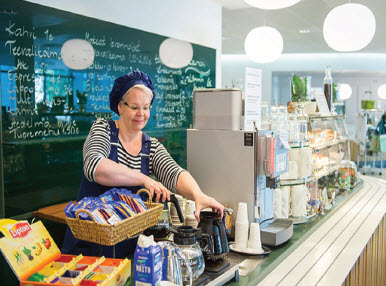A Firstbeat Case Study: The City of Salo
On World Mental Health Day, read about how a city dealt with the fallout after a major technology company felt the full force of an ever increasing competitive market and how the city took a proactive approach to the Health and Welbeing of their citizens.
Background
Salo is a small vibrant nordic city in Southwestern Finland with a history of innovation and industry. It has been a hub of commerce in the region for nearly 400 years and today is home to 55,000 people.
In recent decades, Salo thrived as the epicenter of Finland’s once globally dominant mobile telecom industry. Nokia was originally based in the city and for many years Salo functioned as an important design, engineering and manufacturing center for the company. Seismic shifts in this highly competitive mobile technology industry resulted in layoffs, plant closings and powerful economic uncertainty for the local community. Nokia’s manufacturing plant in Salo was officially closed in 2012 and Nokia’s mobile telephone business was sold to to Microsoft in 2013.
Few households in the community were unaffected, as local unemployment rates exceeded 20 percent. Changing times and economic uncertainty can be physically challenging for individuals. Concerned about a potential increase in stress related illness resulting in workplace absenteeism, the City of Salo introduced Firstbeat Lifestyle Assessment into their employee wellness program.
Firstbeat brought onboard to help with challenges
The first Lifestyle Assessments were performed in 2011 as part of a trial program. During the initial phase of the project, the number of sick days taken by employees participating in the Lifestyle Assessment program was reduced by 30 percent. This early success motivated the continued inclusion of Firstbeat Lifestyle Assessment in the city employee wellness program.
As of Spring 2015, approximately 1500 Lifestyle Assessments had been performed along with nearly 300 follow-up measurements. Each of these Lifestyle Assessments provided an individual employee with personalized insights regarding physical conditioning, stress and recovery cycles, guidance for finding balance at work and maximizing the restorative benefits of leisure activities.
Participation and Reception
The opportunity to participate in the Lifestyle Assessment was offered on a departmental basis with different city departments being targeted each year. Employees were eager to participate in the Lifestyle Assessment when it was offered. Participation rates exceeded 75 percent in instances with some departments reporting participation as high as 95 percent.
Word of mouth was a powerful motivator for participation, as early participants spread favorable reports about their own experiences with the project to co-workers.
An overwhelming majority of participants reported that their Lifestyle Assessment experience resulted in improved health habits. Nearly 80 percent of participants reported that they had been helped “well” to “excellently” by the assessment process. Reported benefits included improved physical fitness, exercise participation frequency, and better grasp on a myriad of stress and recovery issues.
According to the city’s Corporate Wellness Coordinator, Annukka Sistonen, insights provided by the employee’s Lifestyle Assessments were instrumental in guiding systemic improvements departmental policies and work practices.
FIRSTBEAT LIFESTYLE ASSESSMENT CASE STUDY: CITY OF SALO
“[Firstbeat Lifestyle Assessment] offers a great advantage compared to traditional corporate wellness tools. We are able to get a constructive hold on precisely the issues that affect our daily loads. There is rarely a need to change everything, so identifying critical areas and addressing them with the appropriate amount of support and encouragement drives things forward,” she explains.
Another key benefit was a marked increase in health and wellness topics being discussed by employees. Heightened awareness at group level is a critical step in affecting the type of long-term behavioral changes associated with better health.
Notable Revelations:
While the strength of Firstbeat Lifestyle Assessment lies in its ability to deliver personalized insights based on the combination of individual physiology and activities, a few general trends were noticed by participants during the program.
Many employees who participated in the Firstbeat Lifestyle Assessment as part of the city’s wellness project were surprised to discover that work was not the major stress factor in their lives.
Participants were also often surprised by the negative impact alcohol, even in small amounts, has on the body’s ability to recover. While individual results naturally vary, a typical finding was that 2 portions of alcohol was enough to substantially lower recovery efficiency.
Conclusion
Firstbeat Lifestyle Assessment provided city employees in Salo personalized insights and quality guidance for finding lifestyle balance in challenging times. It successfully raised awareness of health issues in the workplace and offered concrete connections between lifestyle decisions and well-being outcomes.
Firstbeat Lifestyle Assessment successfully help reduce illness related work loss. Importantly, initial gains were maintained over time despite increases in illness related absenteeism amongst non-participants.
The case for including Firstbeat Lifestyle Assessment in the city’s wellness portfolio is classic win-win proposition. As City Wellness Coordinator Annukka Sistonen explains. “It gives something useful to employees. In the process, the employer benefits from the changes”.


